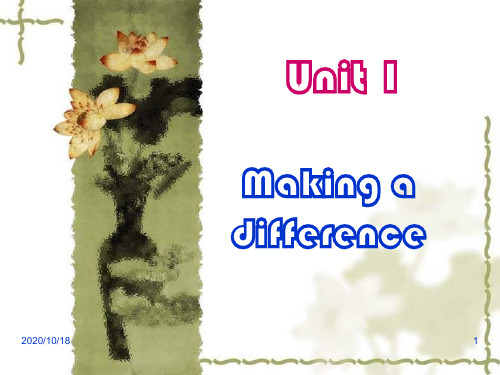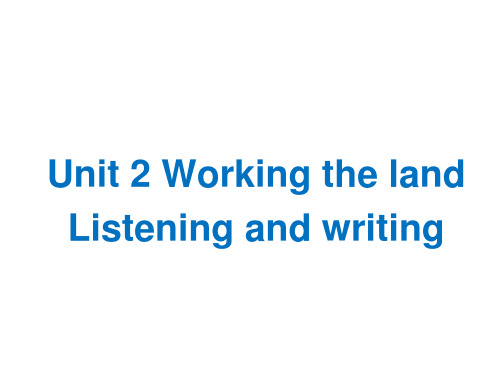高二英语(公开课) ppt课件
合集下载
高二英语写作公开课ppt课件

is
take
10
List main points and key words
书面表达:
假设你是李华,我校拟定于下周五举行一次英语幽默故事大赛。请你给目前在德江二中就读的
你的朋友Linda写一封电子邮件,我邀校请她一起参加。下内周容五包括: 1. 介绍比 问你 对语打 方幽算 的默参 意故加 向事的 。大原赛因;
Yours, Li Hua
Body Ending
14
Structure of an invitation 邀请信结构
Para.1 (beginning)
writing purpose 介绍比赛的相关内容
Para.2 (body)
reasons 说明你打算参加的原因
Para.3 (ending)
expectation\reply 表达愿望(希望对方接受邀请)
3. I would appreciate it very much if you could accept my invitationn.
16
Thinking
Step 1 发散思维,扩充内容 (enrich contents) attention:when\ where\ who\ what\ why\ how
Para.1 介绍比赛的相关内容(5W\1H)
我校拟定于下周五举行一次英语幽默故事大赛。
when: next friday where: our school) who: all students who love English what: Telling English story why: (to improve spoken English
8
书面表达失分表现
9 ;.
take
10
List main points and key words
书面表达:
假设你是李华,我校拟定于下周五举行一次英语幽默故事大赛。请你给目前在德江二中就读的
你的朋友Linda写一封电子邮件,我邀校请她一起参加。下内周容五包括: 1. 介绍比 问你 对语打 方幽算 的默参 意故加 向事的 。大原赛因;
Yours, Li Hua
Body Ending
14
Structure of an invitation 邀请信结构
Para.1 (beginning)
writing purpose 介绍比赛的相关内容
Para.2 (body)
reasons 说明你打算参加的原因
Para.3 (ending)
expectation\reply 表达愿望(希望对方接受邀请)
3. I would appreciate it very much if you could accept my invitationn.
16
Thinking
Step 1 发散思维,扩充内容 (enrich contents) attention:when\ where\ who\ what\ why\ how
Para.1 介绍比赛的相关内容(5W\1H)
我校拟定于下周五举行一次英语幽默故事大赛。
when: next friday where: our school) who: all students who love English what: Telling English story why: (to improve spoken English
8
书面表达失分表现
9 ;.
高二英语unitPPT优选课件

7) ever produced.
20820)/10/18
14
《呼啸山庄》是人的天赋所创造出的最非凡的作品 之一。
she has a genius for music.
have a genius for…在某方面有天赋
2)inspiration (n.)
inspire (V.)
e.g. She was an inspiration to all who knew her.
Why?
Essential to protecting the ecological balance and environment; people can’t live without living things and medicine. Is the key to the progress of human being; it is chemical reaction that produce many new things. Widely used in many fields, such as medicine, industry and agriculture.
Albert Einstein
“想象力比知识更重要.”
2020/10/18
7
“Nothing in the world is to be feared; it is only to be understood.”
Maria Curie
“生活中没有什么可怕的东西,只需要理 解的东西.”
2020/10/18
2020/10/18
2
Scientists
Maria Curie Zhang Heng Charles Darwin
Thomas Alva Edison
高二英语必修全套课件

bandage. 6. _K__ee_p__ the burned area _h_i_g_h_e_r than the
heart, if possible. 7. __G_e_t__ the victim __to__ the doctor or
hospital, if possible.
Read the first aid treatments for
the sun
H2SO4
chemicals
Part 3 Types of burns
There are __th_r_e_e__ types of burns depending on which _l_a_y_e_r_s_ are burned.
First degree burns affect only the __t_o_p_ layer and should feel better within __a__d_a_y_o_r_t_w_o____.
2. What do they tell you about the passage? Causes, types, characteristics and first aid treatment for burns.
1.In which order are these topics covered in the text? Number them from from 1 to 5.
and _c_h_a_r_r_e_d_.
Characteristics of burns
second degree burn
Blisters and watery surface
A
first degree burn
Mildly swollen
heart, if possible. 7. __G_e_t__ the victim __to__ the doctor or
hospital, if possible.
Read the first aid treatments for
the sun
H2SO4
chemicals
Part 3 Types of burns
There are __th_r_e_e__ types of burns depending on which _l_a_y_e_r_s_ are burned.
First degree burns affect only the __t_o_p_ layer and should feel better within __a__d_a_y_o_r_t_w_o____.
2. What do they tell you about the passage? Causes, types, characteristics and first aid treatment for burns.
1.In which order are these topics covered in the text? Number them from from 1 to 5.
and _c_h_a_r_r_e_d_.
Characteristics of burns
second degree burn
Blisters and watery surface
A
first degree burn
Mildly swollen
高中英语词汇公开课(原创)ppt课件

反思教学方法和效果源自制定改进计划,提高教学 质量
感谢您的耐心观看
汇报人:
授课方式
词汇分类:按词性、词义等分类讲解,便于学生系统掌握 词根词缀:通过词根词缀的讲解,帮助学生理解词汇构成和记忆单词 语境记忆:将词汇放入语境中,让学生通过实际运用来记忆单词 练习巩固:提供相关练习,加强学生对词汇的掌握和理解
课程考核
课堂表现:根据学 生在课堂上的互动 和表现进行评估
学会常用语法和句型,提高 写作水平
培养英语思维习惯,增强语 感
掌握高频词汇,提高阅读速 度
激发学习兴趣和动力,提高 英语成绩
为未来考试打下基础
掌握更多词汇
提高阅读理解能力
增强写作表达能力
提升口语交流能力
课程亮点
专业教师授课
经验丰富:拥有多年教学经验的教师授课 授课内容:根据学生实际情况设计课程 授课方式:采用多种教学方法,如讲解、讨论、案例分析等 授课效果:能够帮助学生掌握英语词汇知识,提高英语应用能力
作业完成情况:定 期布置的词汇练习 和阅读理解等作业
期中考试:进行词 汇和阅读理解的测 试,检验学生的学 习成果
期末考试:全面考 察学生的词汇掌握 程度和英语应用能 力
课程资源
课本:提供基础 的知识和练习
课件:精简重点, 方便学生复习和 预习
视频:提供更直观 的学习资源,包括 发音、语法等
图片:帮助学生 更好地理解词汇 的含义和用法
公开课的目的和 意义
掌握3500个英语单词
课程目标
能够正确使用单词,不出现语法错误
了解单词的词性、词义、用法等
能够灵活运用单词进行口语和书面表达
高中生
适用人群
英语老师
想要提高英语词汇水平的人群
感谢您的耐心观看
汇报人:
授课方式
词汇分类:按词性、词义等分类讲解,便于学生系统掌握 词根词缀:通过词根词缀的讲解,帮助学生理解词汇构成和记忆单词 语境记忆:将词汇放入语境中,让学生通过实际运用来记忆单词 练习巩固:提供相关练习,加强学生对词汇的掌握和理解
课程考核
课堂表现:根据学 生在课堂上的互动 和表现进行评估
学会常用语法和句型,提高 写作水平
培养英语思维习惯,增强语 感
掌握高频词汇,提高阅读速 度
激发学习兴趣和动力,提高 英语成绩
为未来考试打下基础
掌握更多词汇
提高阅读理解能力
增强写作表达能力
提升口语交流能力
课程亮点
专业教师授课
经验丰富:拥有多年教学经验的教师授课 授课内容:根据学生实际情况设计课程 授课方式:采用多种教学方法,如讲解、讨论、案例分析等 授课效果:能够帮助学生掌握英语词汇知识,提高英语应用能力
作业完成情况:定 期布置的词汇练习 和阅读理解等作业
期中考试:进行词 汇和阅读理解的测 试,检验学生的学 习成果
期末考试:全面考 察学生的词汇掌握 程度和英语应用能 力
课程资源
课本:提供基础 的知识和练习
课件:精简重点, 方便学生复习和 预习
视频:提供更直观 的学习资源,包括 发音、语法等
图片:帮助学生 更好地理解词汇 的含义和用法
公开课的目的和 意义
掌握3500个英语单词
课程目标
能够正确使用单词,不出现语法错误
了解单词的词性、词义、用法等
能够灵活运用单词进行口语和书面表达
高中生
适用人群
英语老师
想要提高英语词汇水平的人群
高二英语workingtheland4省公开课获奖课件市赛课比赛一等奖课件

Sample writing
1,600 years ago the Chinese writer Jia Sixie wrote a book Qi Min Yao Shu about good agricultural practices. Today some of Jia Sixie’s ideas are still very useful to our modern times, but we have some problems today that he never had in his time.
On Xinjiang farmer, used only half of his fields to grow the same amount of crops as last year. On the other half of his land, he planted fruit trees. The work of people like this is helping to fight the world’s growing deserts.
Answer: B A B
Listening text
FIGHTING GROWING DESERTS Why do we have deserts today? Deserts have not always been here. Most deserts that we have today were once green lands full of the plant life. One of today’s biggest deserts is in North Africa. However, in the 1st century BC farms in the North Africa grew corn and wheat to make bread for the whole city of Rome. How did this area become desert?
Unit5FirstAidUsingLanguageListening听说课公开课课件-高二英语人教

Operator: Next, remove any pillows. Boy: OK. What next? Operator: Now look in his mouth. Any food there? Boy: No. Oh, he's started to breathe again. Operator: So, he's breathing? Boy: Yes, but his lips are blue! He's making strange noises!
4 Tasks
Know emergency numbers home and abroad Know when do we need to call an ambulance Know what makes a successful emergency call Know how to perform rescues in certain conditions
Listen to a 999 call in England and answer the questions..
2 Who else was in the room with the boy and his grandfather? The boy’s mother. 3 How did the boy describe the old man’s condition?
4 Tasks
Know emergency numbers home and abroad Know when do we need to call an ambulance Know what makes a successful emergency call Know how to perform rescue in certain conditions
高二英语教学课件ppt.ppt

3. What do they think about global warming? Do they agree with one another?
They don't agree with each other. Dr. Janice Foster thinks the effects of global warming could be very serious. George Hambley thinks global warming will be mild with few bad environmental consequences. Charles Keeling believes it is the burning of more and more fossil fuels that is resulting in a big increase in carbon dioxide.
See you next time!
caused b the burning fossil fuels. T
4. Natural gas is a greenhouse gas. F
5. Carbon dioxide is a byproduct of burning fossil
fuels. T
6. People accept Charles Keeling’s data T because he took accurate measurements. 7. Flooding could be one of the effects of future global warming. T 8. George Hambley believes scientists are just guessing about the effects of global warming. T
Unit 5 Lesson 2 课件- 高二英语课件(北师大版2019选择性必修第二册)

Vocabulary
8. ______________ adj. 文明的,有礼貌的;公民的 9. ______________ n. 正直,诚实,完整 10. ______________ vt. 教育;教导,指导 11. ______________ adj. 道德(上)的 12. ______________ n. 获得,习得 13. ______________ vi. & vt. 奉献,捐献 14. ______________ n. 金融;财政
Convincing 1 ____________________ stimulate students’ interest in learning. 2 ___________ students need to have clear learning goals for themselves. 3 ____________________________ for students is that they need to make
Lesson 2
The Objectives of Education
Vocabulary
1. ______________ n. 目的,目标 adj. 客观的 2. ______________ vt. 获得,赢得,取得;受益 3. ______________ adj. 多面的,全面的 4. ______________ vt. 追求 5. ______________ adj. 批评的,评判的 6. ______________ adj. 核心的 7. ______________ n. 洞察力;顿悟
Match the expressions to make collocations. Then use the collocations to complete the sentences.
- 1、下载文档前请自行甄别文档内容的完整性,平台不提供额外的编辑、内容补充、找答案等附加服务。
- 2、"仅部分预览"的文档,不可在线预览部分如存在完整性等问题,可反馈申请退款(可完整预览的文档不适用该条件!)。
- 3、如文档侵犯您的权益,请联系客服反馈,我们会尽快为您处理(人工客服工作时间:9:00-18:30)。
非限制性定语从句: 非限制性定语从句和主句的关系并不十分密切, 是对先行词做些附加说明,如果去掉,主句的意思 仍然清楚。这种从句和主句之间往往用逗号隔开 。在讲话时语调上须停顿。一般不用that引导。 1) His dog, which was now very old, became ill and died. 他的狗当时很老了, 生病后就死了。
b. 指人时主格用who,宾格用whom,物主格用 whose(也可指物)。 1) Miss Chen, whom you met in the library, is our new teacher. 2) The Arabs, who are famous for their horses and camels, use these animals for work and in sports. 3) Li Ming, whose mother has been ill for two days, is absent from school today.
Function----practice 1. Peter danced and sang all the evening. Peter used to be quiet. Peter, who used to be quiet, danced and sang all the evening. 2. Mary gave me a picture for my birthday. She had painted it especially for me. Mary gave me a picture for my birthday, which she had painted especially for me.
7. In the past we lost many chances, _______ we paid little attention. A. which B. that C. in which D. to which 8. The pen, _______ I had been writing for ten years, was broken. A. with which B. with that C. as D. with it 9. Mary has two brothers, ________ are doctors. A. both of they B. both of whom C. both of them D. whom of both 10. The problem _______ you argued about yesterday has been solved. A. that B. what C. why D. for which
c. 另外关系副词when(指时间), where (指地点)也 可以引导非限制性定语从句(注意关系副词why 不能引导非限制性定语从句)
4) He lives in the city, where there is a high tower. 5) The People’s Republic of China was founded in 1949, when he was born.
(去掉从句, 主句的意义仍然完整:他的狗生病死。)
2) Yesterday I met Li Lei, who seemed to be very busy. 昨天我碰上李雷了,他好象很忙。
(去掉从句, 意义仍然完整:昨天我碰上李雷了。) 2. 非限制性定语从句中的一些问题: a. 非限制性定语从句中, 指物时, 用which而不用 that。 1) Football, which is a very interesting game, is played all over the world. 2) All the books there, which have beautiful pictures, were written by him.
11. My aunt bought me a book, the name _______ I have forgotten. A. of it B. which C. whose D. of which 12. On the way home I met my friend John, from _______ home the thief had stolen a computer. A. whom B. which C. that D. whose 13. I hate the way _______ you talk to your mother. A. by which B. on which C. in which D. which 14. At last we found the hole in the wall _______ the mouse got into the house last night. A. in which B. which C. through which D. by which
d. 介词加关系代词也可以引导非限定性定语从句。
6) Wu Dong, with whom I went to the university, is just my high school classmate. 7) Her bag, in which she put all her books, has not been found. 8) The story about the Long March, of which this is an example, are well written.
定语从句
{
限制性定语从句(restrictive) 非限制性定语从句( non-restrictive)
Tom was the only person that I could depend on. 汤姆是我唯一的可以依靠的人。 His mother, who loves him very much, is very strict with him. 他妈妈十分地爱他,对他要求很严格。
4. The reason _______ he was late again was that he was caught in a traffic jam in the rush hour. A. which B. in which C. why D. of which 5. His glasses, _______ he could see nothing, was taken away by a naughty boy. A. which B. without which C. with which D. without those 6. The computer, _______ he paid ¥3,000, was once owned by his uncle. A. which B. for which C. that D. to that
1. 作宾语时可省略 关系词 的使用 上 2. 可用that 3. 可用wபைடு நூலகம்o 代替whom
通常译成主句的并 列句
1. 不可省略 2. 不用that 3. 不可用who 代替
whom
1. Yesterday Mr. Li finally bought his own house, _______ is a hospital. A. in where B. to the east of which C. to the east of it D. in the east of that 2. My brother's purse, _______ he put ¥1,000, was missing on the bus. A. there B. which C. in which D. that 3. The football match _______ the students competed yesterday was very wonderful. A. in which B. which C. in that D. that
15. Last night we saw two movies, _______ was interesting. A. both of which B. neither of which C. both of them D. neither of them 16. I used to live in a house, ____ grew a tall tree. A. in front of it B. in front of which C. in the front of which D. in front of that 17. The Second World War _____ millions of people were killed ended in 1945. A. when B. during that C. in which D. which
限制性定语从句和非限制性定语从句的区别
限制性定语从句 形式上 意义上 非限制性定语从句
不用逗号“ ,”与主句隔 开 是先行词不可缺少的定语, 如删除,主句则失去意义或 意思表达不完整
用逗号“ ,”与主句 隔开 只是对先行词的补充 说明,如删除,主句 仍能表达完整的意思。
译成先行词的定语: 译法上 “…的 ”
1. 限制性定语从句和非限制性定语从句: 限制性定语从句: 所谓限制性定语从句就是先行词在意义上不可 缺少的定语,如果去掉, 主句就会失去意义或意 义不完整。这种从句和先行词的关系十分密切, 写时不用逗号和主句分开。 e.g. I was the only person who was invited. 我是我们办公室唯一被邀请的人。 (如果把从句部分去掉, 整个句子的含义就变了)
3. We picked all the apples. They will be transported abroad. We picked all the apples, which will be
